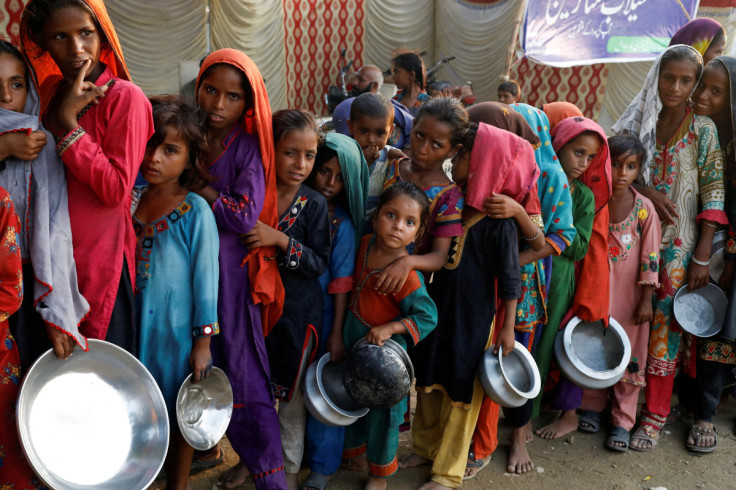Explainer - COP27: What Is 'Loss And Damage' Funding, And Who Should Pay?

The question of whether rich nations should offer funding to vulnerable states hit by climate-fuelled disaster has dominated negotiations among nearly 200 countries at this year's U.N. climate summit in Egypt.
The COP27 summit follows a year of such disasters, from floods that killed more than 1,700 people in Pakistan to drought withering crops in China, Africa and the U.S. West. That has intensified developing country demands for a dedicated "loss and damage" fund, which rich countries have for years resisted.
Here's what you need to know.
WHAT IS "LOSS AND DAMAGE"?
In U.N. climate talks, the phrase "loss and damage" refers to costs already being incurred from climate-fuelled weather extremes or impacts, like rising sea levels.
Climate funding so far has focused mostly on cutting carbon dioxide emissions in an effort to curb global warming, while about a third of it has gone toward projects to help communities adapt to future impacts.
Loss and damage funding would be different, in specifically covering the cost of damage that countries cannot avoid or adapt to.
But there is no agreement yet over what should count as "loss and damage" caused by climate change - which could include damaged infrastructure and property, as well as harder-to-value natural ecosystems or cultural assets.
A June report by 55 vulnerable countries estimated their combined climate-linked losses over the last two decades totalled about $525 billion, or about 20% of their collective GDP. Some research suggests that by 2030 such losses could reach $580 billion per year.
WHO PAYS? WHO GETS PAID?
These questions are contentious.
Vulnerable countries and campaigners have argued that rich countries that caused the bulk of climate change with their historical greenhouse gas emissions should pay.
The United States and European Union have previously resisted the argument, fearing spiralling liabilities. The EU changed its position during the COP27 summit and has said it would support a fund under certain conditions including that China - which the U.N. classifies a developing country, but which is also the world's second-biggest economy - pays into it.
Any agreement to launch a fund would still need countries to thrash out details, such as where the money should come from and which countries or disasters qualify for compensation.
A few governments have made relatively small but symbolic funding commitments for loss and damage: Denmark, Belgium, Germany and Scotland, plus the EU.
Some existing U.N. and development bank funding does help states facing loss and damage, though it is not officially earmarked for that goal.
WHAT WILL HAPPEN AT COP27?
After pressure from developing countries, nations agreed to put loss and damage on the summit agenda for the first time.
Developing and emerging economies arrived with a united demand that countries agree to establish a loss and damage fund.
The EU has said it can back a fund only if it targets support for the most vulnerable countries. That could include island states like the Maldives and Jamaica, although there is no formal definition yet.
Even if COP27 yields a deal to form a fund, it could still take a couple of years before it is ready to disperse money.
Some countries have suggested a "mosaic" of funding sources be organised, rather than one central fund. That could include pulling in cash from existing international funds, although some experts say issues like long delays make those funds unsuitable for addressing loss and damage.
WHAT IF COP27 FAILS TO ADVANCE THE ISSUE?
Already mistrustful after wealthy nations failed to deliver $100 billion in annual climate finance by 2020, some countries are exploring other routes.
The "V20" group of 58 vulnerable countries and the G7 group of rich nations launched an effort called "Global Shield" at COP27, aimed at strengthening insurance and disaster protection finance.
Meanwhile, climate-vulnerable countries are seeking contributions for a pilot loss and damage funding facility. Other ideas include U.N. Secretary-General Antonio Guterres's call for a windfall profit tax on fossil fuel companies to raise funding.
The Pacific island country Vanuatu, meanwhile, is asking the world's highest court - the International Court of Justice - to issue an opinion on the right to be protected from adverse climate impacts. An ICJ opinion could carry moral authority and legal weight, strengthening calls for compensating poor nations.
© Copyright Thomson Reuters 2024. All rights reserved.





















